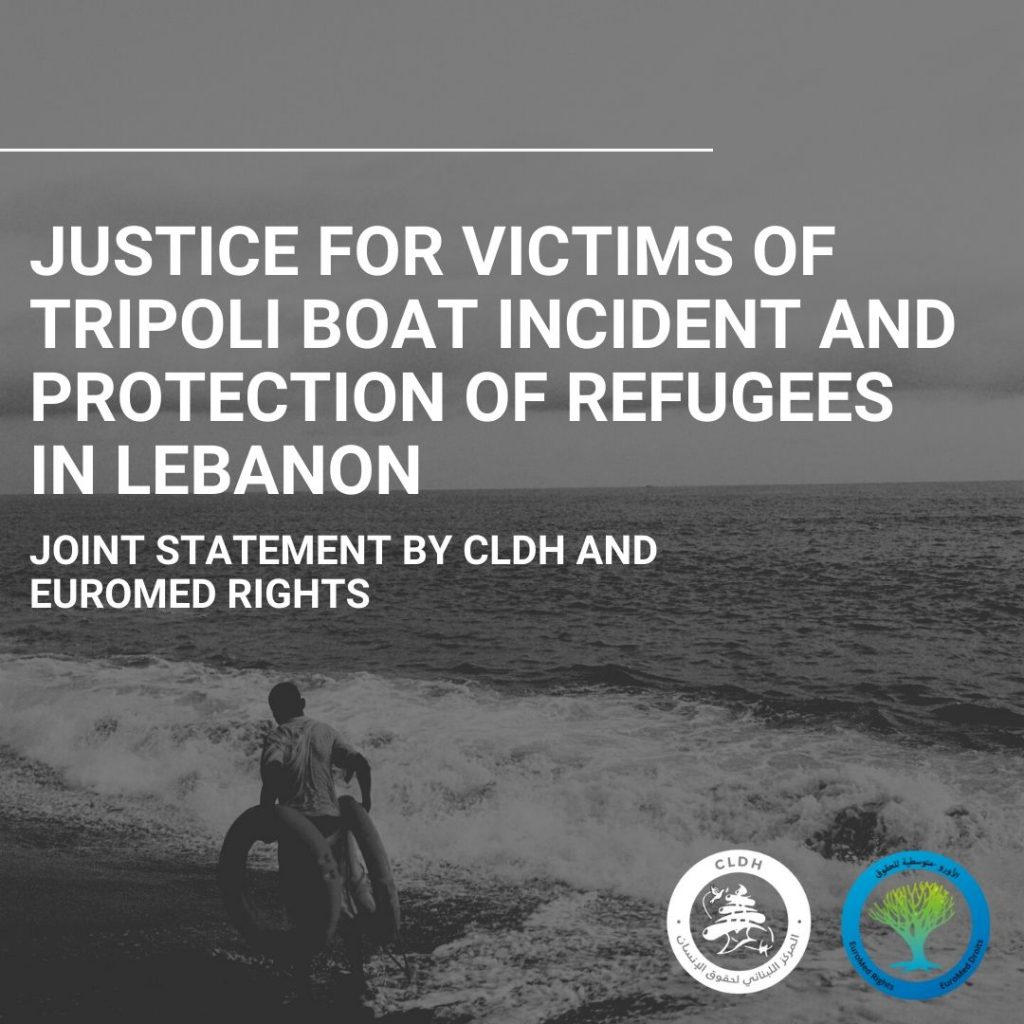EuroMed Rights and the Lebanese Center for Human Rights call for a transparent investigation on the circumstances behind the Tripoli boat incident.
On 23 April, 2022, a boat carrying dozens of travellers capsized about three nautical miles off the coast of Tripoli as they were attempting to leave Lebanon by sea. The people on board were Lebanese, Syrians and Palestinians. The army’s naval forces were able to rescue 48 people while at least 7, including a little girl, were reportedly found dead. Dozens of these passengers are still missing until today.
Survivors’ Testimonies
Many survivors have expressed to media outlets that a deliberate clash between the Lebanese Army’s naval forces has caused it to sink.
In parallel, the Lebanese government has issued no official communication confirming the number of passengers, the missing or even the confirmed victims. The Intelligence Directorate has responded to these testimonies through a public conference, denying any deliberate clash with the passengers’ boat.
On 26 April, the Intelligence Directorate stated continued investigations, on the basis of an instruction issued by the Government Commissioner to the Military Court Judge Fadi Akiki. The government’s rapid response to the incident leaves a trail of ambiguity around the circumstances of it and the fate of the missing passengers.
Negligence in the search and rescue operation
Until today, dozens of people remain missing. Weeks after the incident, authorities showed complete negligence and lack of seriousness in searching for the missing and confirming their numbers and identities.
Increased threats on refugees’ situation
Although passengers on the sinking boat held Lebanese, Syrian and Palestinian nationalities, Lebanese President, Michel Aoun, in a statement issued on 27 April, 2022, used threatening words against Syrian refugees instead of focusing on the unfortunate circumstances of the shipwreck.
In response to the matter, Aoun stated on 27 April, 2022 in a Cabinet session that the situation of irregular migrants shall not continue, declaring: “I had called for international support for refugees in their countries, and I confirm that they would go back in 48 hours once the decision is confirmed, yet unfortunately they stay and cry here…Syria is safe for their return now in many areas…”
The latter alarming statement dismisses many threats on Syrian refugees residing in Lebanon, and sets them at risk of deportations. It additionally disregards many international reports1 that prove the unsafety of returnees to Syria, putting them at risk of arbitrary detention and even torture.
Increased smuggling routes and risk of pushbacks
Lack of legal residency, protection and threats of deportations for Syrians together with the recent socio-economic and political crisis have led to an increase in smuggling sea routes, especially to Cyprus, out of the country mainly for Syrians and Lebanese. According to UNHCR and IOM, since 2020 over 1,500 people have attempted dangerous sea journeys. Over 75% of those were intercepted or returned. Many of them have been illegally pushed back by Cyprus to Lebanon, including women and children, and some of them have been subsequently deported to Syria. According to UNHCR, so far in 2022, at least 64 people on board three boats deported from Lebanon, two of these boats were intercepted before departing.
In response to the government’s reaction to Tripoli’s incident, and in reference to the Universal Declaration of Human Rights that Lebanon has ratified, EuroMed Rights and CLDH condemn these violations and call upon the authorities for the following:
- A transparent and independent investigation revealing the reasons behind the sinking of the boat and verifying survivors’ testimonies, while ensuring that the investigating entity is not the army itself.
- A public and official statement put forward by the government revealing the number of passengers, the missing and the dead.
In response to the President’s statement, the undersigned organisations call for the following:
- Respecting Lebanon’s international commitments of non-refoulement, in article 3 of the CAT convention which Lebanon ratified in 2000 and in article (6) and (7) in the ICCPR which Lebanon ratified in 1972.
- Respecting the Memorandum of Understanding signed between the Lebanese State and the UNHCR in September 2003, which “provides a mechanism for the issuing of temporary residence permits to asylum seekers.
- Ensuring that people embarking on dangerous sea smuggling routes from Lebanon and returning are provided access to legal aid and fair trial.
- Ensuring that all asylum seekers, including refugees, are provided with safe alternatives and fair investigations.
In response to the risk of pushbacks, the undersigned organisations call on:
- The Republic of Cyprus to make public the content of the readmission agreement signed between Cyprus and Lebanon, and to provide access to territory, asylum and adequate reception conditions to asylum seekers arriving by boat to Cyprus.
- The European Commission to call on Cyprus to refrain from any violations of the principle of non-refoulement and to reveal the content of the Cyprus-Lebanon readmission agreement.
Signatory Organisations:
- EuroMed Rights
- The Lebanese Center for Human Rights (CLDH)

